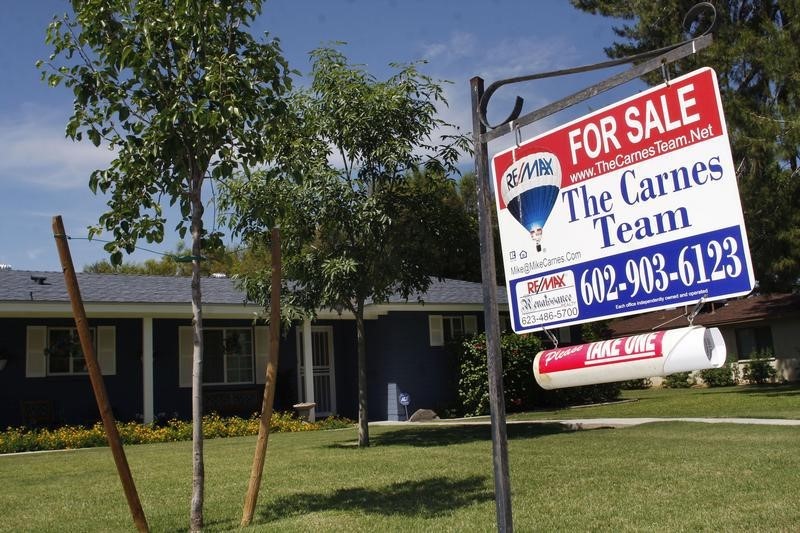By Andrea Hopkins
OTTAWA, Aug 25 (Reuters) - The sharp reversal in Toronto's home prices has thrown Canada's biggest property market into chaos, with scores of buyers suddenly short of money and desperate to get out of deals that looked good just a few months ago.
Much of that turmoil is not just down to those who bid at the peak and now wanted to get out of a deal, but also to lenders tightening credit and property appraisers lowering their valuations.
Given how long the housing boom lasted, a retreat was hardly unexpected, but after a nearly decade of bidding wars and swift deals real estate agents, lawyers, lenders and mortgage brokers struggle to cope with the new reality.
"The big issue is with financing," said John Pasalis, president of the Realosophy real estate brokerage in Toronto.
The first sign of a problem often comes when the lender sends out an appraiser, who judges the property is worth less than what the buyer offered a month or two earlier. A lower valuation means a smaller loan from the lender.
Pasalis gave an example of a buyer who expected a C$1 million ($800,000) loan from the bank only to have it cut to C$850,000 days before the deal was set to close.
"All of a sudden you have to come up with an extra 150 grand," Pasalis said. He estimated that up to 5 percent of deals were at risk now, something unheard of a year ago.
Toronto home prices are down nearly 19 percent from the April peak and resales were about 40 percent lower in July than a year earlier, according to the Toronto Real Estate Board data.
Two people with direct knowledge of the matter said that lenders had reduced their average valuation on properties by 12 to 15 percent since March.
Property appraisers say that while they are the ones to break the bad news to buyers, it is the lenders that hire them who are getting more conservative.
"They have certainly tightened up their criteria," said Dan Brewer, an appraiser and mortgage broker in Toronto's Richmond Hill suburb and former president of the Appraisal Institute of Canada.
For example, lenders can require that the comparable sales used to help determine the value of the house be limited to a shorter period or smaller geographic area to ensure the appraisal reflects the cooling market, Brewer said.
As a mortgage broker he sees the impact of more risk-averse lenders, he said, with many more calls from buyers who need a second mortgage because the first one no longer covers their bid.
"I would say about 20 percent of our files are now asking for secondary financing. That is a marked increase," said Brewer.
LAWYERS AND ALTERNATIVE LENDERS
The market rapidly cooled in April after the government tightened rules and Home Capital Group Inc HCG.TO , Canada's biggest non-bank lender, ran into liquidity troubles, spooking other lenders and causing a pullback in mortgage financing.
With buyers short of money and sellers desperate to close deals before home prices drop further, many turn to lawyers. Sellers want to sue those dragging their feet on an agreed purchase while buyers look for a way out of a contract without losing between C$50,000 and C$100,000 in deposits.
Real estate lawyer Bob Aaron said he discouraged clients on both sides from considering a lawsuit, which could takes years to resolve and cost C$30,000 to C$40,000 in legal fees.
Instead, he is trying to help work out some compromises with sellers either agreeing to give buyers more time to get the money, dropping their price or offering to help with financing.
"Some people want to walk away, some want half their deposit back, some bury their head in the sand and say 'I'm not closing, if they want to sue, fine.'" said Aaron.
Realtors say re-listings have surged in recent months, but it is not clear how many follow deals that collapsed and how many are listings with adjusted, lower prices.
Buyers' scramble for cash means brisk business for mortgage brokers and alternative lenders.
"What we have found recently is a whole bunch of aborted deals ... and we've stepped in," said Robert Goodall, chief executive of Atrium Mortgage Investment Corp AI.TO .
Lenders like Atrium pool money from wealthy individuals to lend to borrowers unable to access cheaper bank credit.
Atrium offers buyers second mortgages and bridge loans at between 7.5 percent and 8 percent interest - double or triple the rate available for a first mortgage.
"It is actually really good business ... these are good people with impeccable credit ratings, who just got caught," said Goodall.
Mortgage brokers say they keep getting more requests for second mortgages, but Mortgage Professionals Canada Chief Economist Will Dunning said he was unaware of any reliable source that tracked the data.
Brewer said that most borrowers now managed to secure second mortgages from alternative lenders, but the higher costs and rising Bank of Canada official rates were bound to hurt the broader market at some point.
"There will be an impact in the Canadian banking world. It may simply be the second mortgage guy gets wiped out and the first takes less of a beating, but really the Canadian housing market would be at risk, there is no question in my mind." ($1 = 1.2526 Canadian dollars)
